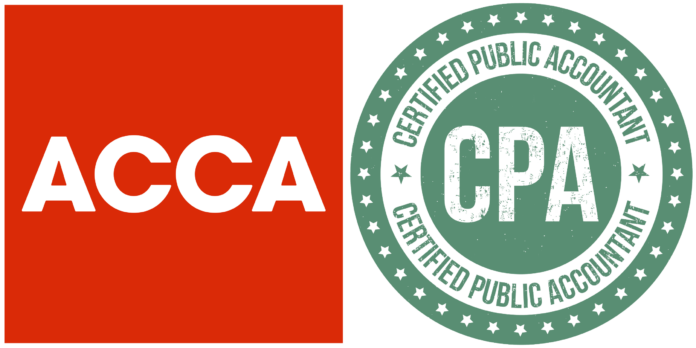When it comes to individuals pursuing a career in finance or accounting, one such decision that could be a major turning point in one’s career is whether to go for ACCA or CPA. Both the ACCA (Association of Chartered Certified Accountants) and CPA (Certified Public Accountant) are widely accepted designations with equivalent goals of providing lucrative professions relating to the fields of accounting, finance, and auditing. Nonetheless, each of these is appropriate for certain professions and places. In this article, we will look at the differences that exist between the ACCA and CPA in detail and all about ACCA and CPA to aid you in making the right choice.
What is ACCA?
The ACCA is the Association of Chartered Certified Accountants. It is a non-profit international accountancy organization based in the UK. It offers a uniform qualification in accounting, taxation, audit, and financial management for finance specialists across the globe. The ACCA program qualification is famous for its flexibility as well as diversity in topics, thus suitable for individuals who wish to pursue various careers around the globe.
Key Features of ACCA
- Global Acceptance: ACCA is recognized by more than 180 countries and has prominent financial markets like the UK, Europe, the Middle East, and Asia. This acceptance on a global scale enables ACCA practitioners to operate almost in every other part of the globe.
- Details of All Courses: The curriculum of ACCA includes certain aspects like financial reporting, auditing, taxation, management accounting, corporate law, professions, and business ethics. The extensive curriculum ensures all the ACCA degree holders are equipped well to take on various positions in finance.
- Distance Learning: With ACCA, students can work on a part-time basis or combine their studies with full-time employment, which facilitates the completion of the certification at the discretion of the individual banker.
- Accreditation period: Generally, ACCA requires about 3-4 years because it depends on how fast a candidate scores passing marks for all the examinations. The qualification is composed of 13 examinations divided into three levels Applied Knowledge, Applied Skills, and Strategic Professional.
Advantages of ACCA
- ACCA allows the candidates to choose the time of their exams as well as how they study, which makes it easier for the working class.
- Numerous career options become available such as working in audit, financial management, and taxation among other areas.
- ACCA practitioners can find work in all sectors including but not limited to, public accounting firms, blue chip companies, non-governmental, and government organizations.
What is CPA?
The CPA or Certified Public Accountant qualification is the most reputable level of proficiency in a particular area of practice accountancy in the US. Ultimately, it is controlled by the American Institute of Certified Public Accountants (AICPA). This qualification is considered one of the highest and most admirable certifications for accounting professionals who desire to practice in the US or in organizations that adopt the US GAAP.
Key Features of CPA
- Reputation around the World: Even though CPA is mostly acknowledged in America, its credentials have a global reach, especially in countries that practice the US accounting principles. It is appreciated by all auditing and consulting firms who have US clients most of whom are multi-national corporations.
- Narrowed Skills: CPA’s scope is limited to understanding thoroughly the US GAAP, US federal tax, and US standards of Audit. This is suited for individuals looking to work in the field of public accounting provision, auditing, and taxation in the United States of America.
- Exam Structure: The CPA exam is composed of four distinct sections, namely: Financial Accounting and Reporting, or FAR, Auditing and Attestation, or AUD, Regulation, or REG, and Business Environment and Concepts, or BEC.
- Timeline: Usually, the CPA course may be completed in 18 months to two years assuming the candidate has successfully passed all four sections of the exam within the eighteen months.
Advantages of CPA
- The CPA is one of the most prestigious credentials in the profession to possess, especially in the United States and countries where US financial standards are adopted.
- It facilitates career progression into more focused areas such as public accounting, taxation, and compliance with an emphasis on US laws and regulations.
- In most cases, it has been seen that the salaries of CPA professionals are higher in the USA and areas that are US GAAP compliant.
Difference Between ACCA and CPA
When comparing ACCA and CPA, the key differences come down to focus areas, duration, and recognition. Here’s a detailed comparison:
| Factor | ACCA | CPA |
| Primary Focus | Global accounting standards, IFRS | US accounting standards, GAAP, US taxation |
| Duration | 3-4 years | 18 months to 2 years |
| Number of Exams | 13 exams | 4 exams |
| Global Recognition | Over 180 countries | Primarily recognized in the US, but valued globally |
| Eligibility | 10+2 education with exemptions for graduates | Bachelor’s degree, usually with accounting credits |
| Career Path | Auditor, tax consultant, financial manager | Public accountant, tax specialist, auditor |
| Work Experience Requirement | 3 years of relevant experience | 1-2 years of relevant experience (varies by state) |
Eligibility Criteria:
- ACCA: As far as the ACCA eligibility is concerned, it is open to all those who have completed their 10+2 and above education. Also, Commerce graduates or graduates possessing degrees like B.Com, M.Com, or MBA, etc. may qualify for exemptions from certain exams. Moreover, CA or such qualified professionals can also seek certain exemptions based on their education or work experience.
- CPA: The CPA eligibility criteria are more rigorous. This is because, a candidate can only apply for the CPA after having received a bachelor’s degree that has a concentration in accounting and finance, which is often between 120 and 150 credits. The rules may differ from state to state in the US, but on a general note, candidates planning to take the CPA exam must possess many credits in accounting. In addition to passing the CPA qualifying exams, a candidate must adhere to a specific experience requirement of a particular state, which is in most cases between 1 and 2 years.
Salary Expectations in India
- ACCA Salary: In India, entry-level ACCA professionals can earn between INR ₹6- ₹10 lakhs per annum. With experience, salaries can rise to INR ₹15- ₹30 lakhs per annum, especially in multinational corporations.
- CPA Salary: CPAs in the US typically earn higher salaries due to the certification’s prestige. Entry-level CPAs can expect to earn between INR ₹6 to ₹10 lakhs annually, with experienced CPAs earning upwards of INR ₹15 lakhs per annum, especially in senior roles like audit managers or finance directors.
Difficulty Level
- ACCA Difficulty: ACCA is often described as difficult as it encompasses many different aspects. In the ACCA syllabus 13 exams include many topics pertaining to finance, accounting, and tax, and hence take a continuous effort of about three to four years. On the other hand, ACCA allows students to sit for the qualifying examinations on their own time and also offers exemption for those with practical experience making it bearable for those already employed.
- CPA Difficulty: The hardest part of becoming a CPA is the CPA exam and its four components which entail a lot of technical elements. Moreover, the emphasis of the examinations is on the US framework of accounting, income taxation, and legal matters which poses a challenge to most without the US background. Nonetheless, unlike the CPA the exam can be completed in a shorter duration making it appropriate for people seeking a qualification that does not take too long.
Conclusion
As far as accounting and finance certifications are concerned, both ACCA and CPA are widely regarded but the preference, of course, depends on the individual’s professional orientation and the country of practice. Looking for worldwide acknowledgment in the eyes of both aspirant and actual employers driven by employment mobility ones upon completion of ACCA. By contrast, one would take up CPA if one intends to practice accounting, auditing, or taxation in the US particularly when dealing with US GAAP-compliant entities. In the end, there are good opportunities with both but you must decide based on the choice you see for yourself in the future.
Also Read: AI to make significant mark in healthcare & education in India: Experts







